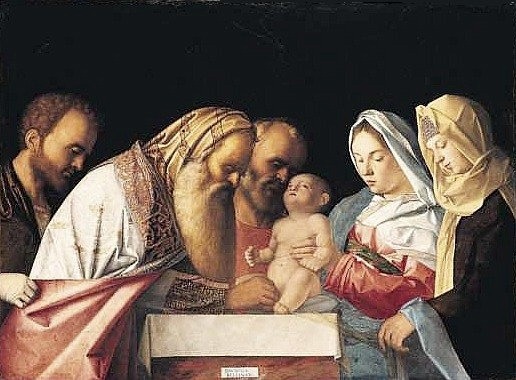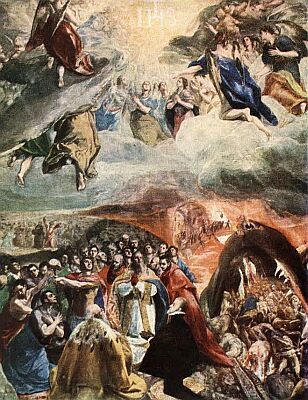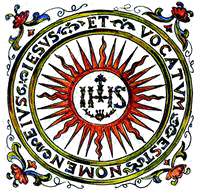 This Solemn Feast Day is that of the Mary under the title Mother of God (Θεοτόκος – Theotokos). She has this title in virtue of Jesus who, though having two natures, is one person. And Mary, though not the mother or origin of Jesus’ divine nature, is Mother of Jesus in terms of his human nature. And since Jesus is God, and one person, not two, she is properly called Mother of God. Thus this title comes to her on account of Jesus Christ.
This Solemn Feast Day is that of the Mary under the title Mother of God (Θεοτόκος – Theotokos). She has this title in virtue of Jesus who, though having two natures, is one person. And Mary, though not the mother or origin of Jesus’ divine nature, is Mother of Jesus in terms of his human nature. And since Jesus is God, and one person, not two, she is properly called Mother of God. Thus this title comes to her on account of Jesus Christ.
An interesting aspect of this feast however is how focused the readings are on God the Father. Both the first and second readings as well as the psalm are surely intended to more deeply root us in our own divine filiation (in Christ) and thereby instill in us a deep affection, love and trust for our heavenly Father.
And yet Mary, in today’s feast, has an important and mystical role in presenting us to the Father. Only Jesus can open the door to the Father, but Mary, in her motherly care for us, also desires us to Love the heavenly Father.
How is this seen in the feast today? Note that it is the Eighth Day since Jesus’ birth. On this day, as a Jewish male infant, Jesus is brought by Mary and Joseph to the Mohel, (the Jewish Rabbi or expert in circumcision). At this moment in the Jewish life such an infant is brought to the Lord wherein more than a surgery is performed, but, even more a covenant relationship begins. Jesus, in terms of his Divinity needs no covenant relationship for He and the Father are one. But in terms of his humanity, he and his parents follow the Law exactly.
But, understand this, Mary is also mystically our mother and in carrying Christ this day, she also mystically carries us. How is this so? Scripture says that we are, by our baptism incorporated into Christ. We become members of his body (e.g. 1 Cor 12:27; 1 Cor 6:15; Rom 12:5; and many others). As St. Paul reminds us, when Christ dies, we die, when he rises we rise (e.g. Romans 6:3-4; 2 Cor 4:10). Hence, what happens to Jesus, happens to us if we are a member of his body.
Mary’s prayer for us – Thus, today, as Mary carries him in his humanity to the heavenly Father, she also mystically carries us. And for us, perhaps we can hear her say: “Here is your Father and Jesus, opens the way for you to Him by his blood. Now look upon your Father, with and in my Son and learn to love and trust the Father.”
So, lets accept Mary’s prayer and invitation as she, who is our mother, asks us to love our heavenly Father. We do well to focus especially on the reading from the Book of Numbers and the letter to the Galatians which the Church (also our Mother and typified by Mary) asks us to read and experience. Note that these readings are the very opening words of the Church at the New Year. Thus, to reflect on them will also well prepare us for the New Year ahead.
Consider three basic points in terms of how we are blessed in knowing and being in a Covenant relationship with our Heavenly Father:
I. The Foundation of our Blessing – In the text from Numbers 6 we see that God gives clear instruction that he both wants to bless the people and how He wants to bless them: The LORD said to Moses: “Speak to Aaron and his sons and tell them: This is how you shall bless the Israelites. Say to them: And there follows the text of the Aaronic Blessing which we will discuss in a moment.
But note here, it is God’s will and desire to bless his people. This is the foundation of our blessings: God’s will and desire to bless us. God wants to bless us! It is He who initiates every blessing. We should not consider blessings as mere incantations that call down desired ends, and surely not as incantations that some how force God’s hand. God is not a vending machine, whereby we press the right combination of buttons there comes forth the desired product. He is God and the blessings the Church confidently bestows, proceed from his demonstrated will and desire to bless his people, and to bless them in whatever way he sees fit.
Note that after giving the blessing formula to Moses, God adds: So shall they [the priests] invoke my name upon the Israelites, and I will bless them.” See therefore the emphatic: “I will bless them.”
Blessings are not mere rituals. They are a reality that change things. When a Catholic is blessed by a priest at Mass or elsewhere, they must have faith that God actually bestows blessings, received in faith. We may not get exactly what we seek, but God does bless and we are confident in the positive effects of blessings given by the priest since God says, “Thus shall the priests invoke my name upon the people…and I will bless them.
The Final Blessing at Mass – It is proper for us to remember at this point that, while there are some who cannot currently receive Holy Communion for any number of reasons. But that does not mean that the blessing of the priest at Mass is of no avail. It surely provides any number of blessings, whether it be the grace of conversion, of consolation, of patience, or of any number of blessings that may help to open doors to restore a person to communion.
But when the priest says, “May almighty God bless you….” So in fact, do blessings come forth, according to God’s good will and to desire to bless.
II. The Fundamentals of our Blessing - Now then we can note the essential elements of blessing by observing the Words God commands the ancient priests to use. The text says: The LORD bless you and keep you! The LORD let his face shine upon you, and be gracious to you! The LORD look upon you kindly and give you peace! These words are very precious and we ought to look at them in some detail
1. The Lord Bless You: The Hebrew ḇerakah – meaning to enjoy happiness; to experience being favored. In other words and in this case, it is as though God is saying these words to Moses that he wants us to experience His will to bless us and show us favor by his grace and mercy. As if to say, “Tell my people to rejoice for I desire to show them favor and grant them graces and blessings.”
2. And keep you – The Hebrew is Shamar, meaning to keep, to watch over, to guard and preserve. Again as if to say, “Tell my faithful people that they have nothing to fear, for I give them a shepherd’s care. I watch them, guard them and shepherd them rightly.” We know of course that it is God’s will at times to lead us through some difficult passes. But even here, he bestows blessings and allows adversity only to bless us, if we are faithful and follow him. God keeps watch over us. He sees ahead and has already provided the graces we need to make it through.
3. The LORD let his face shine upon you, and be gracious to you! – What does it mean to let God have his face shine on us? It means to know the Father. It means to have Him come and show Himself to you. And when the Father’s face shines on us in this way, we are never the same again. Yes, His face shines on you. You know and experience His benevolence, you know His love. And to the extent that that happens for you, you can never be the same again.
And on account of this, trust and confidence begins to dawn on you, even in dark moments. For now, at such moments, it’s different, for you’ve seen his face, you’ve known his love and favor, and you trust his providence.
This is a very precious gift to be sought. For too many people, even Christians, God the Father is a stranger. He is an old man with beard who runs the universe and somehow loves us, in some abstract way. But fundamentally, He is a stranger for many.
But do you see the gift that the Lord wants to give us today as Mary carries us (in Christ) to the convent relationship signified by circumcision? God wants us to let the light of his face shine on us, so that we personally know him, and love him and trust him. Jesus has opened the way to the Father, and there is nothing more precious to him and Mother Mary, than that we come to experience his love and graciousness for us.
Grab hold of this gift that Jesus died to give you. More of this gift in a moment.
4. And give you peace - And here is the result of experiencing the Light of God’s face: shalom. It is peace to be sure but more than peace understood as an absence of conflict. Rather it is the peace that comes from receiving completeness, soundness, and the deep and abiding experience that everything is alright. This can only come authentically to us as the result of experiencing the light of God’s face, shining upon us. And when it does there comes an increasingly unshakable peace that the world did not give and the world cannot take away. Even in the midst of storms, there is, at a deeper and broader part of us a shalom, a conviction and experience that everything is alright.
Ah, what magnificent blessings God wants to bestow on us! But there is more and we hear of it in the second reading today from the Letter to the Galatians.
III. The Fullness of our Blessing – In the second reading to day from Galatians, St Paul goes on to describe the normal Christian life as a life in the Holy Spirit whereby we experience God the Father as “Abba.” Lets look at the essential part of the text:
When the fullness of time had come, God sent his Son, born of a woman….so that we might receive adoption as sons. As proof that you are sons, God sent the Spirit of his Son into our hearts, crying out, “Abba, Father!” (Gal 4:4-6)
Now Paul uses a strong word: “Proof.” And what is this proof that we are the sons of God? The proof is that we have and experience the Holy Spirit, and, on account of the Holy Spirit, are able to experience God the Father in such a way as to cry out “Abba.”
So, of course the question is, what does it mean to say “Abba?” To cry out “Abba” means to have the grace of divine tenderness. To have in our heart the grace to love God the Father, to love Him with the same tenderness and affection with which Jesus loves him. It is to have a divine affection for God. As sons of God, we are children now, and we share in Christ’s sonship. And thus, by this grace of the Holy Spirit, we come to love God the Father more and more as Jesus does.
And how does Jesus love the Father? Simply put, He’s crazy about Him. He loves the Father with a divine and unspeakable affection. He trusts Him with his whole life; right through to the end, through suffering and death.
To call God Abba is the movement the heart toward God the Father with affection and love, and tenderness. And, as a work of the Holy Spirit, it is the Spirit’s role is to transform our heart into the heart of Jesus so that this becomes possible.
And as we come to experience this reality we also realize that we cannot produce this love, trust, tenderness and affection by ourselves. It is the work of the Holy Spirit. It is not just saying the word “Abba.” (Heck, a parrot can be taught to say the word); it is experiencing the reality of God as Abba. That God is my Father and that I love him with a tender affection and trust, and joy.
If you have never experienced this, get on your knees and ask God for it. He is more than waiting for you to ask. This is the normal Christian life.
This is the fullness of our blessing, that God the Father makes his glorious face shine upon us and that we come to know and experience him as Abba, our wonderful and loving Father.
Do you see how this can transform your life? And do you see that this is the normal Christian life that Jesus died to give us?
What an wonderful way to start the New Year of 2012, by loving trusting and experiencing God the Father as Abba, and allowing his glorious face to shine on us!
Today, Mother Mary, on her feast as Mother of God, is not content to have us focus on her. Rather she, with motherly tenderness, carries us, as she carried Christ, to a covenant relationship with the heavenly Father. Jesus, her tiny infant Son, did not need to form this relationship, He already had it. But we, mystically in Him, do need it. And thus she carries us, in Jesus, to the Father and says, “Behold your Father, who loves you, your Abba, who makes his face to shine upon you.”
Jesus alone can open this way, and Mary, carrying us in Jesus, in this eighth day of circumcision, of Covenant love, acts as a Mother, and shows us our Father, through Christ her son and our Lord.
Happy Feast of Mary Mother of God. Look at her, she’s pointing to the Father. There is no better way to start the new year of 2012. We may not know what the future holds, but that’s alright. We know Him who holds the future. And I’ve got a feeling that everything is going to be alright.
In this video, Fr. Francis Martin reflects on these same realities: (Click on the article title to see the video)






 This Solemn Feast Day is that of the Mary under the title Mother of God (Θεοτόκος – Theotokos). She has this title in virtue of Jesus who, though having two natures, is one person. And Mary, though not the mother or origin of Jesus’ divine nature, is Mother of Jesus in terms of his human nature. And since Jesus is God, and one person, not two, she is properly called Mother of God. Thus this title comes to her on account of Jesus Christ.
This Solemn Feast Day is that of the Mary under the title Mother of God (Θεοτόκος – Theotokos). She has this title in virtue of Jesus who, though having two natures, is one person. And Mary, though not the mother or origin of Jesus’ divine nature, is Mother of Jesus in terms of his human nature. And since Jesus is God, and one person, not two, she is properly called Mother of God. Thus this title comes to her on account of Jesus Christ.